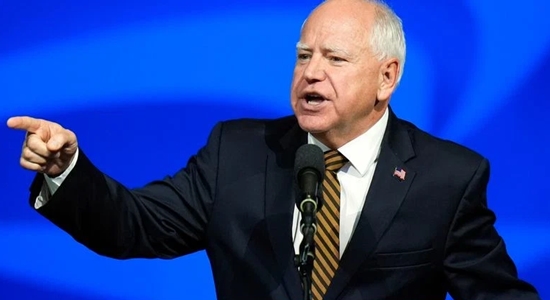
James Comer, chairman of the House Committee on Oversight and Accountability, is wondering about the vice-presidential candidate’s susceptibility to Chinese influence operations and isn’t letting the matter slide. His committee will be investigating:
“The CCP has sought to destroy the United States through coordinated influence and infiltration campaigns that target every aspect of American life, including our own elected officials,” Comer says in a formal statement.
“Americans should be deeply concerned that Governor Walz, Kamala Harris’s vice-presidential running mate, has a longstanding and cozy relationship with China. Mr. Walz has visited China dozens of times, served as a fellow at a Chinese institution that maintains a devotion to the CCP, and spoke alongside the President of a Chinese organization the State Department exposed as a CCP effort to influence and co-opt local leaders. FBI briefers recently informed the Committee that the Bureau’s Foreign Influence Task Force investigates CCP activity that is similar to China’s engagement with Governor Walz. The American people deserve to fully understand how deep Governor Walz’s relationship with China goes.”
“Connections”…?
Newsweek puts the word “connections” in scare quotes in its August 16, 2024 headline, “Time Walz Target of Republican Probe Over China ‘Connections,’ ” and in its article states that “there does not appear to be any personal connection between Walz and the CCP.” Which seems to suggest that Comer has no particular reason for launching an investigation into the governor’s “longstanding connections to Chinese Party entities and officials,” as the Committee puts it.
I guess it depends on what the meaning of “connections” is. If you’re meeting and working with CCP officials again and again over many years, maybe not the same ones each time, only the same entity being represented each time, i.e., the CCP…well, is that a connection or a quasi-connection or…or a full standard connection but only an impersonal one…or…or what? Well, fair enough. Let’s find out.
Newsweek reports that Walz (shown above) “has expressed clear criticism of the Chinese government,” which sounds fine; and that he also said, in a 2016 interview, that he does not “fall into the category that China necessarily needs to be an adversarial relationship,” which does not sound fine. One problem with the supposition is that when the government of another major country is determined to be in an adversarial relationship with your own government and country, your government is in an adversarial relationship with the other government whether you like it or not and whether your government acts on the basis of that fact or not.
Foreign Policy contributor Paul Musgrave, a political science professor, says that Walz “Has Always Been Consistent on China” and that his record is one of “measured critic of the Chinese Communist Party—prone neither to exaggeration nor accommodation.”
“Measured”…?
“Measured” means what exactly? Often it is code for wishy-washiness and inconsistency. Is it “measured” to say things like “The Chinese government wants us to buy what they sell, but won’t buy what we sell” (quoted by a local paper in 1991) as an example of realistic, head-on, unvarnished criticism of the actions of the Chinese government? Is it measured to be, as Musgrave puts it, “neither a hawk nor a dove” about the Chinese government?
Speaking of words, how exactly does a critic of the CCP “exaggerate” the bad things about the CCP? Does “exaggeration” in this context mean noticing too many of the bad things? The censorship and the surveillance and the endless interference in economic activity and the propaganda and the influence operations and the transnational repression and the bullying of nearby countries and the genocides and…?
The author also stresses that Walz “values facts…rather than theory or ideology,” as if fact and theory were inherently incompatible and unrelated realms; and also raising the question whether Professor Musgrave benefits from even a vague acquaintance with Walz’s ideological record as governor.
Musgrave suggests that everything we could want to know about Walz’s relationship to the CCP is right there in the local newspaper accounts. But maybe not. Let’s find out.
Should we? Is the announced investigation an appropriate expenditure of Chairman Comer’s time and that of other investigators?
After all, Walz isn’t in the White House yet. If he gets there, it won’t be for several more weeks. He’s still the governor of Minnesota. If Walz ports the personal consequences of Chinese influence operations into the White House, this will take place only very soon, not immediately.
On the other hand, if disturbing facts about Walz’s connection to the CCP should be brought to light by the committee’s investigation and widely reported before voting begins, voters would be more likely to take these facts into account. In that case, Comer’s investigation might serve to help prevent CCP influence as internalized by Governor Walz from reaching the White House.
Do it
So, yes, this investigation is a worthwhile use of Comer’s time. He should devote all the resources he can to it and release a comprehensive report on Walz’s interactions with and relationship to the Chinese Communist Party as quickly as possible.
Also see:
House Committee on Oversight and Accountability: Letter to FBI Director Christopher Wray
The letter requests documents that may assist the Committee in its investigation of Walz’s connections to the Chinese Communist Party.





